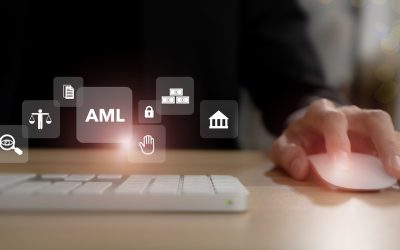Regtech Terms 101: Definitions Made Simple
If you’re in the process of implementing or revising your money laundering and financial crime protocols, you’ve no doubt come across the many terms and acronyms associated with financial regulations. As fintech and related financial crime mandates continue to evolve, many teams find it difficult to stay on top of new terms, entities, and other relevant organizations you need to know.
At iComply, we’re honored to help you build transparency with your own clients and gain access to a range of trusted resources to stay compliant with jurisdictional guidelines, as well as protect your organization when it matters most. As an innovative provider of an award-winning Know Your Customer-focused suite of modular software, our team is here to make sure you’re able to stay in the know when it matters most.
Below, we’ll cover the 10 most common terms found within the fintech and financial regulation technology (regtech) markets. Read on to learn more!
Anti-Money Laundering (AML)
Money laundering is one of the biggest threats to today’s global market, with an estimated USD $800 million to $2 billion being laundered each year. Anti-Money Laundering (AML) legislation and regulation play an important role in safeguarding both businesses and their customers against fraudsters, as well as limiting the negative effects of common financial and asset-based crimes such as terrorist funding, human trafficking, the drug trade, and much more.
AML regulations hold banks and other financial institutions that issue credit or deposit accounts to specific standards in an effort to prevent money-laundering activities through these types of accounts.
API
Within the fintech industry, you will often come across the term “API”, which is short for Application Program Interface. APIs are digital tools that enable different disconnected computer programs to talk to one another and—in the case of KYC protocols—share customer due diligence data and documents with greater simplicity, reliability, and accuracy.
CDD/EDD
Customer Due Diligence (CDD) and Enhanced Due Diligence (EDD) refer to the building of customer risk profiles based on key information gathered during onboarding. The ultimate goal of CDD is to identify customers and their current and historical financial activity, generate a customer risk profile, and assess all relevant information with basic CDD, Enhanced Due Diligence (EDD), or Simplified Due Diligence (SDD) for enhanced transaction monitoring and ongoing risk reporting.
Decentralized Exchange (DEX)
Decentralized Exchanges (DEXs) enable peer-to-peer exchanges of digital securities, cryptocurrencies, and other virtual assets without the need for a centralized fail-safe like those required by a banking institution. Decentralized exchanges are often in the news with cryptocurrency-related matters. With no third party involved in the handling of funds, monitoring transactions for fraud risk can be difficult but essential for preventing financial crime.
False Positives
False positives refer to any test results that incorrectly flag a user or incident for a nonexistent violation. As one of the biggest hurdles for identity verification and KYC programs to overcome, false positives are a key regtech term to learn. Even the most refined anti-fraud software will still occasionally produce a false positive. With the right verification protocols in place, well-executed AML and KYC practices will be able to catch false positives and quickly rectify the situation.
GIFCS
The Group of International Finance Centre Supervisors (GIFCS) is a long-established group of financial services supervisors that are focused on promoting the adoption of international regulatory standards—especially in the banking, securities, fiduciary, and AML/CFT sectors. The GIFCS represents the interest of its jurisdictional members for various banking matters under the umbrella of funds and securities activities.
Know Your Customer (KYC)
Know Your Customer (KYC) is a mandatory information gathering and screening procedure that businesses and financial institutions must follow in order to properly verify the identity of new and existing clients. KYC standards apply outside financial services and encompass any business where money laundering or terrorist financing risk exists.
Security Token
A security token refers to either a physical or digital device that allows an individual to provide two-factor identification and verify their identity when logging into a service online.
Travel Rule
The Travel Rule, also known as FATF’s Recommendation 16, refers to stipulations placed on monetary and virtual asset exchanges occurring on decentralized exchanges such as the cryptocurrency market. This recommendation seeks to add additional information to transactions to sufficiently identify the originator as well as the beneficiary.
Virtual Asset
Virtual Asset refers to any digital or non-tangible asset that can be assigned a monetary value and exchanged as currency or used for investment purposes.
——————————————————————————
Stay in the Know with iComplyKYC
Curious to learn more key terms relevant to the fintech and regtech markets? Take a look through our glossary of current terms and acronyms on our site here.
At iComply, we know that staying on top of fraud can be tough. That’s why we’re proud to offer a truly end-to-end KYC solution for businesses and institutions across North America and Europe. Designed with ease of use and seamless integration with your existing workflows, iComplyKYC makes financial compliance simple and streamlined.
Discover how we do it by talking to our team today and booking a demo of our modular KYC platform solutions.
learn more
Is your AML compliance too expensive, time-consuming, or ineffective?
iComply enables financial services providers to reduce costs, risk, and complexity and improve staff capacity, effectiveness, and customer experience.
Request a demo today.
The Power of AML Monitoring Tools: Strengthening Compliance and Security
In the high-stakes world of finance, the battle against money laundering and financial crimes is relentless. For businesses, the threat of illicit activities isn't just a regulatory concern—it's a significant risk to their reputation and bottom line. Anti-Money...
Top 10 Features of Effective AML Compliance Software: An Expanded Guide
In today's digital age, the threat of money laundering and financial crimes is more significant than ever. Financial institutions and businesses must be equipped with robust Anti-Money Laundering (AML) compliance software to detect and prevent illicit activities. But...
Understanding KYC Platform Integration: What It Is and How to Achieve It
Navigating the world of regulatory compliance can often feel like trying to find your way through a maze. For businesses, particularly those in the financial sector, integrating a Know Your Customer (KYC) platform is a strategic necessity that simplifies this journey....



